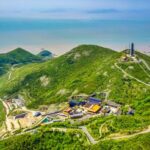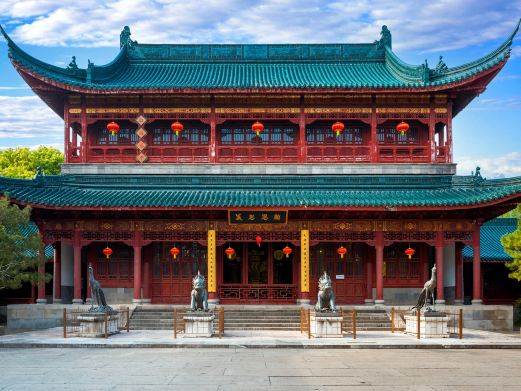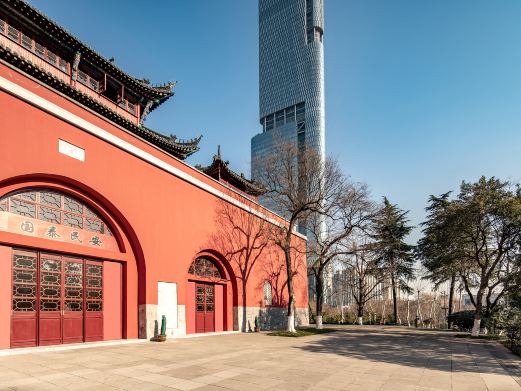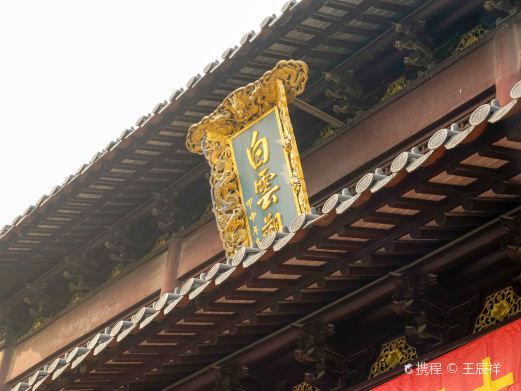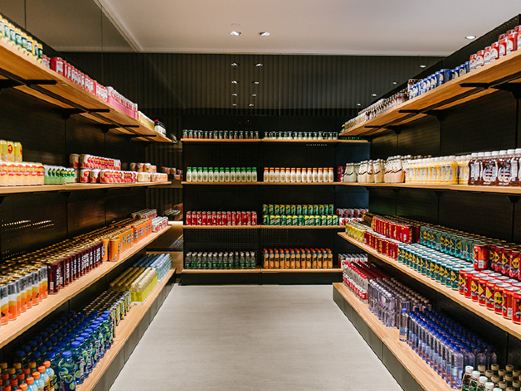Yuyuan Tai Chi Astrology Village is located approximately 20 kilometers away from Wuyi County, and it is the origin of the Yu family lineage. It is said that this area was once plagued by disasters of water and drought. During the Ming Dynasty, Liu Bowen redesigned the village according to the arrangement of celestial bodies, constructing buildings such as the Big Dipper-shaped Qi Xing Pond and Qi Xing Well, which put an end to the disasters. Today, Yuyuan remains largely undeveloped for tourism, retaining its original and rustic charm with few tourists. Occasionally, one can spot art students sketching the scenery. The village features exquisite carvings in places like the Sheng Yuan Hall and the Yu Family Ancestral Hall, as well as in some old residences, making it well worth a visit. The village is small and ideal for exploring on foot.
Upon entering the scenic area, one first passes through an ancient forest where many trees are six hundred years old. Beside the forest, an S-shaped stream flows gently. From a high vantage point, the open space here and the rice fields on the opposite bank form a vast Tai Chi diagram, with the fish eyes being a sunken circular pit and a towering circular grove. The Bowen Thatched Cottage at the entrance of the village was built in memory of Liu Bowen, and the exhibition inside displays his life, handwriting, and statues. Proceeding further into the village, one truly enters after passing through the Xuanwu Gate. Along the way, one passes through a sunflower garden, which is very photogenic when the sunflowers are in bloom. The first stop is the Yu Family Ancestral Hall, which boasts a beautifully carved stage and numerous plaques, mostly consisting of the Yu family’s family precepts. Inside the hall, there is a large scale model of Yuyuan Village, allowing you to get a general understanding of its layout. The Li Family Ancestral Hall behind the Yu Family Ancestral Hall is much smaller and has been converted into a folk artifacts exhibition, which can be casually browsed. Crossing the bridge along the stream and turning right, one soon arrives at the Sheng Yuan Hall. This ancient residence is not only large in scale but also notable for its carvings. On the three main beams of the hall, there are carvings of animals that fly in the sky, walk on land, and swim in water, all vividly depicted. What is even more incredible is the ‘Hundred Fish Beam’—the nine carp on the beam change to yellow, red, and black colors with the climate, a transformation that visitors cannot witness directly but can appreciate the craftsman’s ingenuity. The Dongzhu Temple on the edge of the village has a history of over 700 years. Beside the ancient camphor tree, there is an inscription from the Daoguang period, which is said to be effective for prayers. If someone persuades you to burn incense and donate, you can politely refuse if you have no intention of doing so. In recent years, some newly built houses have made the entire village feel a bit chaotic. However, the eastern part of the village has a concentration of distinctive residences, with carvings and exteriors suitable for photography. It is worth spending some time strolling around. Among them, the wood and brick carvings of Shang Wanchun Hall and Jing Shen Building are particularly exquisite. Yu Hou Hall is a large-scale building in the village, with 108 rooms, featuring rare exquisite wood carvings and a highlight of dragon and phoenix beams. Walking through the small stream on the west side of the village and crossing the road, one can climb the mountain along the stone steps to overlook the entire village, and the previously mentioned rice fields forming the Tai Chi diagram can also be seen in full view.Most of the farmhouse stays in the village that provide food and accommodation are relatively simple, and tourists generally do not stay overnight or dine here.
Several kilometers around the village, attractions such as Qingfeng Fortress and Liu Xiu Ridge are well-known Danxia landscapes in Wuyi, which can be arranged in the same itinerary. If visiting in the summer, the Jiu Long Valley rafting opposite is recommended to be included in the tour. The opening hours are from 08:30 to 17:00 all year round. For preferential policies, please refer to additional explanations: The information above is for reference only, and specific information should be based on the day’s disclosure by the scenic area. Service facilities: Parking lot – [Yu Yuan Tai Chi Star Village Parking Lot], reference price: ¥10 per time; Address: 20 kilometers south of Wuyi County, Jinhua City, Zhejiang Province; Number of spaces: 100. Must-see tip: Guided tours within the scenic area cost 30 yuan per session, covering all attractions, and last about 1.5 hours.




